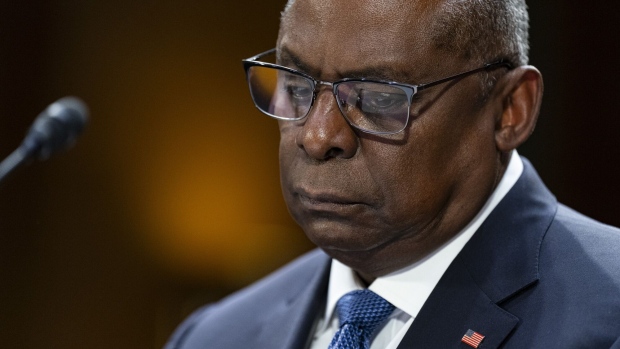Feb 14, 2024
Pentagon Chief Austin Is Released from Hospital After Latest Health Scare
, Bloomberg News

(Bloomberg) -- Defense Secretary Lloyd Austin was released from the hospital Tuesday after undergoing a procedure for a bladder problem, the latest health scare for the Pentagon chief just as he sought to move past a furor over his handling of complications from prostate-cancer surgery.
Austin, 70, “is recovering well and resumed his full duties and functions,” the Defense Department said in a statement. But it said that “on the advice of his doctors, Secretary Austin will recuperate and perform his duties remotely from home for a period before returning to work at the Pentagon later this week.”
Doctors at Walter Reed National Medical Center said in a statement that Austin was treated for “a bladder issue” that “was corrected with non-surgical procedures.”
Austin underwent treatment for prostate cancer in late December and was hospitalized for two weeks in January over complications from that surgery, an episode that touched off a furor because he waited for days to inform President Joe Biden and Congress of the cancer and the hospitalization.
The latest health setback forced Austin to cancel a trip to Brussels to meet with other defense chiefs, and he’s now scheduled to address a meeting of his counterparts from nations supporting Ukraine virtually on Wednesday morning.
Austin was released from his initial hospitalization on Jan. 15 after about two weeks. He later apologized for his secrecy concerning the illness, including his failure to notify Biden of his cancer diagnosis for several days. He returned to work at the Pentagon on Jan. 29 for the first time in almost a month.
Earlier: US Defense Chief Leaves Hospital After Stay That Caused Uproar
The secrecy set off criticism in Congress as lawmakers demanded explanations from Austin. The Pentagon’s internal watchdog said it would investigate whether the Defense Department’s procedures are sufficient to ensure appropriate notifications and a transfer of authority if a senior leader falls ill.
The doctors at Walter Reed, John Maddox and Gregory Chesnut, said in their statement that Austin’s bladder problem was “related to” his prostate cancer surgery but it was “not related to his cancer diagnosis and will have no effect on his excellent cancer prognosis.”
(Updates with doctors’ statement, in final paragraph.)
©2024 Bloomberg L.P.






